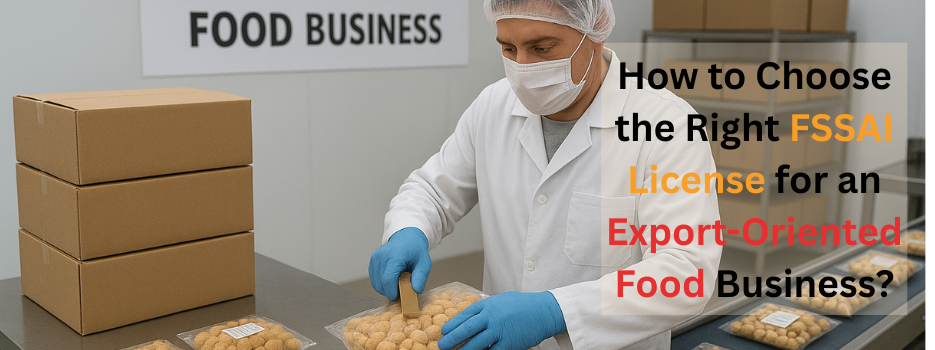The export-oriented food business is required to meet all national and international rules & regulations. The connection of such food businesses is to both the domestic authority and the exported country’s administration. Starting an export-oriented food business from India means qualifying for the FSSAI license. The Food Safety and Standards Authority of India is a statutory body for the management of food items and their elements. The food export is also managed by FSSAI under the Food Safety and Standards Act, 2006. But how can the export-oriented FBOs select the right food FSSAI license to avoid legal challenges? Let’s delve into this guide to explore which food registration is mandatory for export food businesses, including registration requirements.
A) Who are the Export-Oriented Food Businesses?
The export-oriented FBOs are companies that produce and sell food products to global markets. From large to small, industries are involved in the food export to global markets. India’s major companies that play the role of export-oriented food businesses are:
- ITC: Exports multiple food products such as processed food, spices, and agricultural items.
- Nestle: One of the strongest and most established multinational export industries.
- Haldiram’s: Exports snacks and frozen food to international buyers.
- Amul: One of the largest Indian companies provides dairy products. It is also active in the export of dairy items.
B) FSSAI Registration: Choose the Right License for Food Export Business
The FSSAI food license is categorized into three types: Basic Registration, State License, and Central License. However, those who deal in large-scale operations, such as international manufacturers, importers, and exporters, must be required to obtain special permission. Anyone who is associated with the export of food products is eligible for the Central FSSAI license. Regardless of the company’s annual turnover, the Central Food License is compulsory for export-oriented food businesses. In addition, the FSSAI central license is also different for different types of exporters.
C) The Types of FSSAI Central Licenses for Exporters
Based on the business model, the export FBOs must select the right subtype under the FSSAI central license. In more detail:
- Exporter-Manufacturer Subtype: If there is a manufacturer that produces the food items itself and then exports to global markets, it comes under the Exporter-Manufacturer subtype. During the central license registration, the exporter needs to provide information, such as detailed information of the manufacturing unit, layout plan, etc.
- Merchant-Exporter Subtype: If any exporter purchases the foods from a domestic manufacturer and sells the items under their brand, they must select the Merchant-Exporter subtype. However, the NOC (No Objection Certificate) is mandatory from the manufacturer to export food items.
- Export-Oriented Unit (EOU): Those FBOs that are recognized as the Export-Oriented Food Unit by the Ministry of Commerce are eligible for the 100% Export-Oriented Unit to obtain a Central License.
D) What is the Eligibility for a Central FSSAI License Registration?
To get the food license, the export-oriented FBO is required to meet the specific requirements. The export-oriented food businesses must maintain activity as either an exporter or an importer. The eligibility criteria for a central food license are
- Export & Import: To legally deal as a food importer or exporter, one must obtain the compulsory Central FSSAI license.
- Annual Turnover: The FBOs whose annual turnover is near Rs 20 crore or above are eligible for the Central License registration.
- Multiple States: For the management of food businesses in more than one state, the FSSAI central license is compulsory.
E) Step-by-Step: Apply for Central FSSAI License
The Food and FASSI license application is online, making the registration process easy for export-oriented food businesses. For application registration, the common window is the Food Safety Compliance System (FoSCoS) portal. Follow these steps for the streamlined registration process:
| Step 1: Sign in to FoSCoS | Navigate your web browser to the government website “FoSCoS.” If you have never done this before, the first step is creating an account. |
| Step 2: Proceed to the Application Section | Once you set up your account on the portal, access the “Apply for license/registration” application section. |
| Step 3: Choose Business Type | Select the state and, according to your business model, choose the “Manufacturer” category & specify yourself as an “exporter.” |
| Step 4: Complete Form B | To apply for a Central license, you are required to fill out Form B. Must fill out the complete and correct business details on the application form. |
| Step 5: Attach Documents | You need to provide multiple documents as business registration proof. The key documents for food export are required: The IEC (Import-Export Code) from the DGFTIf you are a food manufacturer, complete the manufacturing unit layoutComplete list of machinery and equipmentFood safety management planNOC from the food supplierIf applicable, the turnover proof |
| Step 6: Registration Fees | The annual government fees for a central FSSAI license are Rs 7,500. |
| Step 7: Final Submission | Once you register the application, an Application Reference Number (ARN) will be generated, which can be used to track application progress. |
F) Winding Up | Apply for FSSAI Central Food License for Export-Oriented Food Business
The Central FSSAI License allows the food business to export internationally. The license is not permanent; it is required to be renewed after a specific period. To avoid the late renewal penalty, apply for the Central FSSAI license renewal at least 30 days before its expiry. During the food export, ensuring the safety, quality, and labeling standards is also crucial. The registration process can be completed through the FoSCoS official FSSAI website.

